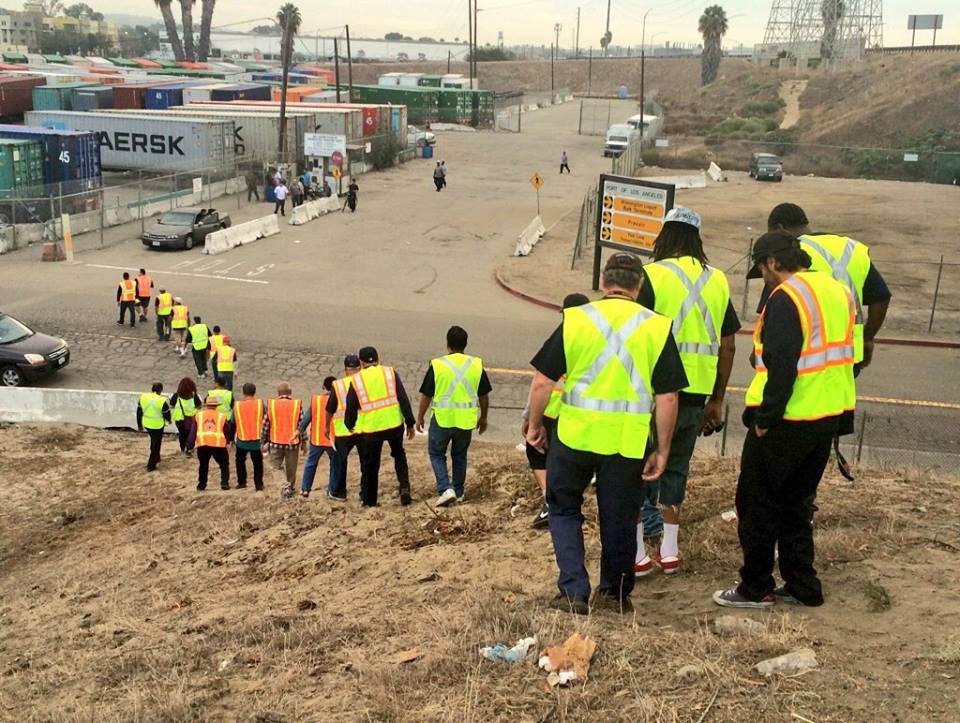Labor & Economy
Port Truck Strike Spreads to Warehouses

Two days ago, with truck driver strikes expanding at Los Angeles-area ports, Capital & Main shared a conversation with a pair of drivers who detailed safety concerns about a trucking system that imposes long hours and unaffordable maintenance burdens. As the strikes spread among trucking companies and into port warehouses, those safety concerns took center stage with a shocking accident.
Bicyclist Killed
On Tuesday afternoon a shipping container slipped from a truck and killed a bicyclist in Carson. The container had struck a railroad bridge, though a witness said that the truck may not have been appropriate for the job.
“I’m assuming that they’re hiring those flatbeds because yesterday it was a flatbed too,” David Alva told ABC7 News. The day before, Alva saw a similar accident that did not involve injuries. “Those containers weigh from 40,000 [pounds] and up. They just strap them on with straps, and they basically tear off.”
While the truck involved in the fatal accident did not belong to one of the companies that drivers have targeted in strikes, the pressures to ignore safety measures remain an industry-wide reality, said Teamster union spokeswoman Barbara Maynard.
“What we’ve got happening here is drivers who are paid by the load instead of by the hour, and so they’re just having to drive faster and faster, and cut corners. We’ve seen so many accidents, people losing their lives,” Maynard told ABC7.
Strikes Expand to Warehouses With Teamster Support
Coordinated strikes have expanded to a third trucking firm, Intermodal Bridge Transport (IBT), along with a warehouse operated by California Cartage on Port of Los Angeles property, as workers engaged more pieces of the logistics chain that delivers 40 percent of U.S. imports through the ports of Los Angeles and Long Beach.
While drivers with port trucking companies have been organizing and striking repeatedly over the last few years, they have recently begun coordinating with warehouse workers to increase pressure on the logistics industry. The Teamsters have entered into a partnership with the Warehouse Worker Resource Center, a nonprofit advocacy group for warehouse workers, and have prioritized organizing the thousands of workers in the warehouse and distribution industry.
Workers at California Cartage’s Wilmington warehouse struck Wednesday morning. They have filed complaints with the National Labor Relations Board as well as multiple lawsuits, alleging labor violations and arguing that the company should be subject to the Los Angeles living wage ordinance, since the warehouse is located on City-owned port property.
This is their second strike, following an action in September that highlighted safety concerns as well as labor violations. Many of the California Cartage workers are long-term temporary employees provided by staffing agencies, an issue covered by Capital & Main investigative reports last year. Thanks to an employer accountability law signed in September, California Cartage is responsible for wages and working conditions, as well as the staffing firms.
Teamsters President Jim Hoffa and Vice President Fred Potter met with truck drivers and warehouse workers Tuesday, then spoke at a rally and joined the picket lines.
Drivers Strike Third Company, Demand Union Recognition
Drivers with IBT also struck Tuesday, joining drivers at Pacific 9 Transportation and local subsidiaries of XPO Logistics. The IBT drivers delivered a petition to the company formally seeking representation with the Teamsters, as well as recognition as IBT employees. The petition was signed by 25 drivers, about a quarter of the drivers who haul containers to and from the ports of Los Angeles and Long Beach for the company. IBT is a subsidiary of the COSCO Group, which is owned by the Chinese government.
The driver strikes have not interrupted port traffic overall, but organizers tell Capital & Main that they have been effective at slowing down business for the targeted companies. In general, drivers and supporters cannot picket secondary targets such as port terminals or warehouses. However, they can picket those locations while a truck from a struck company is on site. This leads many terminals to refuse entry to all trucks from the struck companies, in order to avoid potential disruptions.
A few terminals, such as International Transportation Service and Long Beach Container Terminal, have continued accepting trucks from those companies, which allows strikers to put up picket lines for the 10 minutes or so that a truck is inside. Similarly, pickets have also appeared at the nearby warehouses of Amazon, Proctor & Gamble and Yusen Logistics, which moves goods for Target stores, among others.

-

 Latest NewsFebruary 3, 2026
Latest NewsFebruary 3, 2026Amid the Violent Minnesota Raids, ICE Arrests Over 100 Refugees, Ships Many to Texas
-

 Featured VideoFebruary 4, 2026
Featured VideoFebruary 4, 2026Protesters Turn to Economic Disruption to Fight ICE
-

 The SlickFebruary 2, 2026
The SlickFebruary 2, 2026Colorado May Ask Big Oil to Leave Millions of Dollars in the Ground
-

 Column - State of InequalityFebruary 5, 2026
Column - State of InequalityFebruary 5, 2026Lawsuits Push Back on Trump’s Attack on Child Care
-

 Column - California UncoveredFebruary 6, 2026
Column - California UncoveredFebruary 6, 2026What It’s Like On the Front Line as Health Care Cuts Start to Hit
-

 The SlickFebruary 10, 2026
The SlickFebruary 10, 2026New Mexico Again Debates Greenhouse Gas Reductions as Snow Melts
-

 Latest NewsFebruary 12, 2026
Latest NewsFebruary 12, 2026Trump Administration ‘Wanted to Use Us as a Trophy,’ Says School Board Member Arrested Over Church Protest
-

 Latest NewsFebruary 10, 2026
Latest NewsFebruary 10, 2026Louisiana Bets Big on ‘Blue Ammonia.’ Communities Along Cancer Alley Brace for the Cost.

